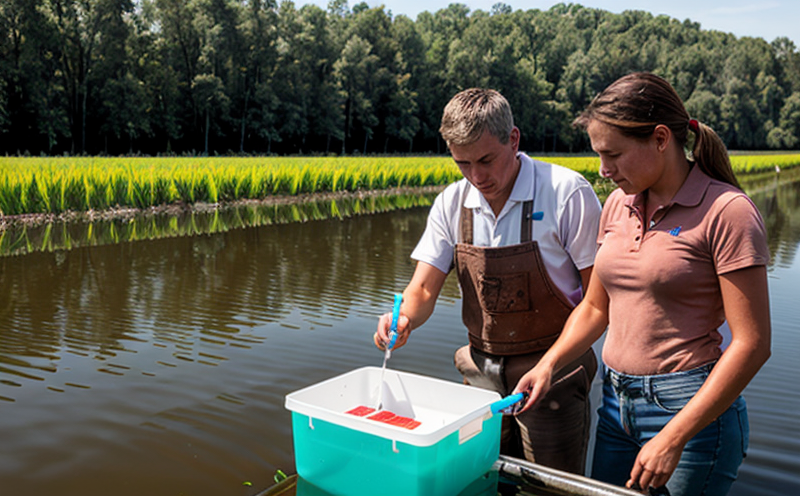Magnesium Content Testing in Agricultural Water
In agriculture and forestry, water quality plays a crucial role in ensuring optimal growth and productivity. Magnesium content is an essential parameter that can significantly impact plant health and crop yield. This service focuses on accurately determining the magnesium content in agricultural water samples using precise laboratory methods.
Magnesium (Mg²⁺) is one of the most important macronutrients for plants, contributing to various physiological processes such as chlorophyll formation, enzyme activation, and carbohydrate metabolism. Deficiencies or excesses can lead to a range of issues affecting plant growth and development. Therefore, accurate magnesium content testing in agricultural water is vital.
The primary objective of this service is to provide reliable and actionable data about the magnesium levels present in irrigation water sources used by farms, nurseries, and other agricultural operations. By ensuring that the right balance of magnesium is maintained, we help our clients optimize their crop management practices leading to healthier plants and higher yields.
Our testing process adheres to international standards such as ISO 7899-2:1996 for the determination of total dissolved solids by gravimetric method which serves as a foundation for assessing water quality parameters including magnesium. We also employ advanced analytical techniques like inductively coupled plasma optical emission spectrometry (ICPOES) to measure trace elements like magnesium with high precision.
The first step in our testing procedure involves collecting representative samples from the irrigation system or source pond. These samples are then prepared according to standardized procedures before being subjected to rigorous analysis. Once analyzed, detailed reports are generated indicating the exact concentration of magnesium along with other relevant parameters such as pH levels and total hardness.
Understanding the role that magnesium plays in plant nutrition allows us to offer valuable insights into how different factors might affect its availability within the soil solution. For instance, certain chemical treatments applied during field preparation could either increase or decrease soluble magnesium concentrations depending on their composition. Similarly, variations in climatic conditions may also influence this balance.
By providing accurate information regarding magnesium content, our service enables farmers and agricultural businesses to make informed decisions about managing irrigation practices more effectively. This not only contributes towards sustainable farming but also helps protect local ecosystems by preventing potential environmental damage resulting from improper use of water resources.
- Improved Crop Health: Ensuring adequate magnesium levels supports robust plant growth and enhances overall crop quality.
- Sustainable Farming Practices: Helps in adopting eco-friendly methods that promote long-term soil fertility without compromising productivity.
- Environmental Protection: Prevents overuse of fertilizers, thereby reducing pollution risks associated with excess nutrients leaching into water bodies.
In conclusion, magnesium content testing is a critical component in maintaining high standards of agricultural practice. By leveraging our expertise and state-of-the-art facilities, we strive to deliver robust data that guides decision-making processes aimed at enhancing both economic returns and environmental sustainability within the industry.
Scope and Methodology
The scope of this service encompasses comprehensive testing for magnesium content in agricultural water samples. This includes but is not limited to irrigation waters sourced from wells, rivers, lakes, and reservoirs utilized by various types of farms including but not restricted to fruit orchards, vegetable plots, and cereal fields.
Our methodology follows internationally recognized guidelines to ensure accuracy and consistency across all measurements. Initially, water samples are collected following strict protocols designed to prevent contamination or alteration of natural conditions. These samples undergo preliminary treatment steps such as filtration and dilution if necessary before being analyzed using modern analytical instruments.
The core technique employed in this service is Inductively Coupled Plasma Optical Emission Spectrometry (ICPOES), which provides highly accurate results for trace element detection including magnesium. Additionally, gravimetric methods based on ISO 7899-2:1996 are utilized where appropriate to cross-validate findings obtained through ICPOES.
Throughout the entire testing process, we adhere strictly to quality assurance procedures ensuring reliability and reproducibility of results. Our team includes trained professionals equipped with knowledge not only in chemistry but also agriculture who understand the importance of proper sample handling and interpretation.
Competitive Advantage and Market Impact
The ability to accurately measure magnesium content in agricultural water offers significant advantages over traditional approaches or less precise methods. Our service stands out by offering rapid, reliable, and cost-effective solutions tailored specifically for the unique needs of agricultural enterprises.
One key advantage lies in providing real-time feedback on nutrient availability which can be used immediately to adjust irrigation schedules if necessary. This proactive approach helps prevent deficiencies while minimizing unnecessary applications of fertilizers. As a result, farmers benefit from optimized resource usage leading to reduced operational costs and enhanced profitability.
Another notable aspect is the support we provide towards achieving regulatory compliance requirements set forth by governing bodies such as the European Union (EU) or Food and Agriculture Organization (FAO). By offering robust testing services, we assist clients in meeting these standards ensuring their operations remain competitive on both domestic and international markets.
The impact extends beyond individual farms and businesses to broader societal benefits. Accurate magnesium content measurements contribute towards more sustainable agricultural practices fostering healthier ecosystems while promoting responsible use of water resources.





